Lessons for integrating health and environment research in SUMERNET
Recently, I had the opportunity to participate in the online webinar “Integrating health into environmental research” where senior and early-career researchers shared their experiences and insights on how to integrate health into environmental research.
The insights ranged from from an overview of how to integrate health into environmental research to lessons learnt from individual projects on the the interdisciplinary nature of research, and case studies that correlated environment, nutrition and health.
Dr. Yanyong Inmuong, Dean of Faculty of Environment and Resource Studies of Mahasarakham University Thailand and member of the SUMERNET steering committee explained how health is being defined in terms of three determinant factors: social and economic environment, physical environment and a person’s individual characteristics and behaviour.
He said two models are important for impact assessment for projects: environmental health
impact assessment (EHIA) linking health with the environment (water, soil etc.), and human health-centered health impact assessment (HIA) linking health with physical, social, biological dimensions of health.
Ms Sofia Anna Enrica Cavalleri, PhD candidate with SEI Asia and Chulalongkorn University shared her perspectives from her research study about health and sustainable food systems in Thailand. She emphasized the need for researchers to understand how health is being conceptualized by different stakeholders. She urged researchers to read the relevant literature before going to interview experts in the field so that questions specific to health impacts can be explored.
Dr. Van Kien Nguyen, researcher with the Health and Agricultural Policy Research Institute, University of Economics, Ho Chi Minh City and member of the SUMERNET steering committee shared his lessons from his research project titled “Integrating nutrition and health into environmental research”. He explained that there is a varying relationship between the nutrition value of different types of food, balance of diet, consumption patterns, and the health of individuals in different households. His research has shown that environmental changes (such as building of water dykes) have resulted in decreased fish catch, that has affected protein intake of communities. In turn, people have replaced fish with other sources of protein like pork. This has nutrition implications since pork contains saturated fat and is not as good for human health compared to fish which is rich in Omega-3 and amino acids.
He also pointed out that the most important thing in integrating health into environmental research is the need to formulate a multidisciplinary team because we need a range of perspectives and advice from different professionals such as health scientists, nutritional scientists, sociologists, and ecologists.
Mr. Wengky Ariando, PhD researcher from Chulalongkorn university shared findings from his research project, “Emerging issues from the social environmental research: Traditional ecological knowledge to planetary health of Indonesian sea nomads (Bajo community). Planetary health is the interaction between the human system and the environmental system. From the concept of planetary health, the interaction between human and environmental systems alone is not enough, but we should also include policy development and community participation.
These insights and lessons from the webinar will prove useful for future research in SUMERNET on the critical cross-cutting field of health and the environment.
==
This piece is based on the online webinar “Integrating health into environmental research” organized by SUMERNET Youth Network on 8th December 2021.
Info
This story is part of the following project
SUMERNET 4 All: Engaging with water insecurity in the Mekong Region
Topic
Country
Related people
You might be interested in
-
SUMERNET Vision Guide introducing the new phase "SUMERNET 4 All"
The new, revised "Vision Guide" for SUMERNET is now available. This vision guide presents an overview of SUMERNET - its origins and governance structure, background to the network, aims, key research areas, engagement with policy, and outreach products
![SUMERNET Vision Guide introducing the new phase "SUMERNET 4 All"]()
-
SUMERNET 4 All Call for Proposals on Joint Action
SUMERNET 4 All (S4A) provides financial support and technical assistance to consortia of researchers and boundary partners from the Mekong Region
![SUMERNET 4 All Call for Proposals on Joint Action]()
-
SUMERNET launches redesigned website to provide a fresh visual look and direction
SUMERNET is proud to announce the launch of our redesigned website to coincide with our new phase of work on addressing water insecurity in the Mekong Region.
![SUMERNET launches redesigned website to provide a fresh visual look and direction]()
 By
By 



 Read more about SUMERNET
Read more about SUMERNET
